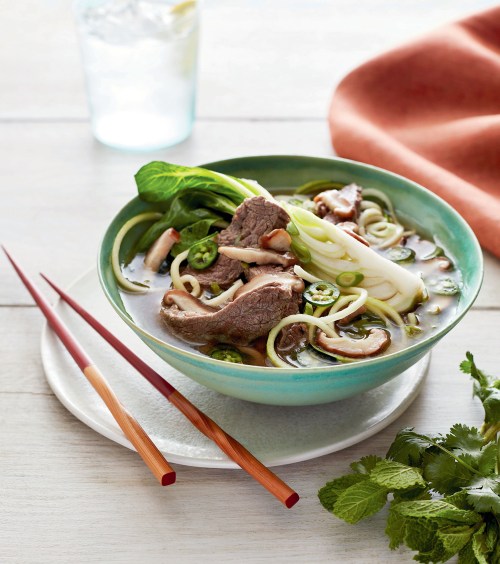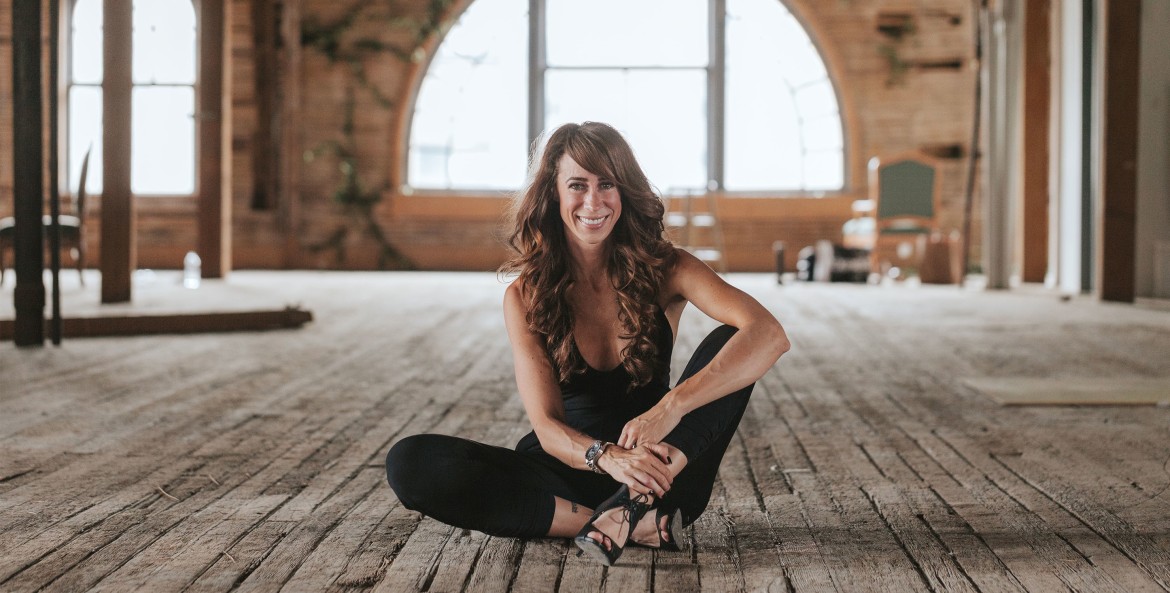AAA Member Melissa Hartwig started Whole30, a massively popular monthlong food regimen that eliminates grains, legumes, dairy, alcohol, and added sugars. A decade ago, her initial experiment changed her life. Today, she’s the best-selling author of seven books, and her Whole30 program has almost 3 million social media followers.
Q. What's your favorite tip for people who are trying to eat healthier?
A. Fat can actually be really good for you! In the 1990s it was all about low-fat foods and meal-replacement shakes. Now we have paleo and whole foods. I like it when people eat a good variety of fats—nuts, seeds, even saturated fats like clarified butter. But the most important thing you can do to start eating better is to learn to cook, which means you're starting off with whole, fresh ingredients. Dietary experts agree that eating more whole foods is the foundation for a healthy diet.
Q. You travel a lot for work. What's the must-have in your carry-on bag?
A. This is going to sound weird, but I travel with more meat than you'd imagine. It's easy to find healthy carbs—apples, bananas—and fats when I travel, but protein is hard to find. So I pack meat sticks and beef jerky, because they're really satiating. Protein will tide you over.
Q. Do you use a food-tracking app?
A. I'm against food tracking. I don't think that documenting, weighing, and measuring everything you put in your mouth leads to a healthy relationship with food. Whole30 helps you learn to eat when you're hungry, stop when you're full, and differentiate true hunger from cravings. Your body knows how much you should be eating better than any calculator you'll find on the Internet.
Q. You're open about the fact that you overcame a drug addiction.
A. When I got clean in 2000, my relationship with food became dysfunctional. That's common for addicts—to go from one numbing aspect to another. I started using food for comfort, numbness, reward, punishment. It wasn't until my first Whole30 experiment that things got better.
Q. What tips do you have for newcomers to the Whole30 program?
A. The biggest thing to keep in mind is that planning and preparation are key. It's unlike anything you've ever done before, especially if you're not used to reading nutrition labels or if you're not already gluten-free. It's a very specific set of rules. [No grains, legumes, soy, dairy, alcohol, and added sugar.] Cleaning out your pantry can be incredibly important. There's no such thing as being over-prepared. You want to make sure you're really well-insulated against the cravings.
Q. What are common pitfalls for people who try Whole30?
A. People think they can wing it. Or they get so excited about starting that they want to start tomorrow. If you can't get through it, it's because you didn't plan and prepare and you freak out. People also don't anticipate the amount of support they need. You need encouragement from real people in your life, and from the online Whole30 community that's awake 24/7. People don't realize how big a change this will be.
Q. Is there a vegetarian version of Whole30?
A. You can't do Whole30 as a vegan, but we do have a lot of vegetarian folks in our community who are trying to apply our principles to their framework. In one of my books I outline how to do so. The rules are similar: We're trying to address your habits and emotional relationship to food. Complete proteins that aren't meat can include fermented organic soy products and quinoa. You still have to eliminate gluten, though, so seitan is out.
Q. You live in Salt Lake City. Is that where you grew up?
A. I grew up in New Hampshire and moved to Utah eight years ago for the mountains and sunshine. But first, I did a big three-month road trip through the United States to look at cities that have an accessible airport and all the amenities of a big city but with a small-town feel.
Whole30 was founded before I moved, but my self-care practices have evolved since living here. Utah has certainly influenced how I connect with people's personal growth. It's easy to spend time in nature here, to connect with friends over activities other than eating crappy food and drinking alcohol. I'm a hiker, a cross-country skier, and a snow-shoer.

Beef pho with zucchini noodles from The Whole30 Slow Cooker.
Q. What was your childhood like in New Hampshire?
A. I had a pretty wholesome, normal childhood. Growing up, we always ate together as a family. My mom was particular about limiting junk food and treats: For the 1980s, it was a really balanced approach to food, and I think that's why I never struggled.
Q. What does your #church hashtag on Instagram mean?
A. I call my excursions into the mountains "church." I have a very deep personal connection to God. I connect best out in nature. I use my time in the mountains to ground and center myself, to let go of emotional burdens. It's deeply meaningful for me.
Q. What's your favorite place to hike in Utah?
A. Probably Big or Little Cottonwood Canyon because they're so close to where I live. There's one hike at Lake Blanche that's my go-to when people come in from out of town. If they're in reasonable shape, I haul 'em up there. It's really challenging, so you feel like you've earned it, but it's also less than two hours to the top.
Q. You ride a motorcycle, right?
A. It's a 2005 Triumph Bonneville. I ride it around town, to and from yoga, the gym, out for pleasure rides. I've had it for five years now. It's a form of moving meditation for me. I'm fully present—I'm not listening to music or a podcast. All I'm doing is paying attention, not in a stressed-out way, just in a present and aware-now way. I'm a very conservative rider, so I don't speed or show off. I just really like being out and exposed to the elements.
Q. You're an online influencer. How do you keep your digital life organized?
A. I don't mix and match personal time with work time. When my son is with his nanny, I block off time to totally focus on work. In the evening when I'm with my son, I'm not trying to answer emails. Really separating those things has been helpful. When it comes to social media, I'm in control of my use. A lot of people feel like social media is happening to them. I make sure that I'm the one who dictates what comes into my feed. If it's not serving me, I unfollow. If I need to take a break, I just log out. It's important that I use social media for the greater good and for my community. I've had to work really hard at this. It's been trial by fire. I have hundreds of direct messages coming at me, so I took notifications off all my services years ago, and that's been really big. People will take as much as you're willing to give; that's just human nature. If I allowed it, I could be responding to messages all day, every day. I have to be the one to control my use.
Q. You've been using the #metoo hashtag on Instagram. Why is the movement important to you?
A. I'm not shy about expressing my views on important social issues, especially when it comes to the #metoo movement. As a sexual-assault survivor and recovering drug addict, in that order, I've spent a lot of time in therapy accepting, processing, and finally recognizing what happened to me for what it was—rape. Yet the women I talk to in my direct messages—hundreds of women—are still shouldering the responsibility for their assaults, still being told to keep quiet, still feeling guilt and shame for something that was not their fault. I have a voice, and I have a following, and I have a responsibility to speak out for those who have yet to find their voice. If I can't use my platform to stand up for things that are important to me, what the heck is it good for?
Q. You have a huge millennial fan base.
A. We do have a huge millennial fan base. But our fastest-growing demographic is the baby boomers. Members of my parents' generation are on multiple prescription medications, have an extra 20 or 50 pounds on their frame, have been diagnosed with prediabetes or a heart condition, and aren't keeping up with their grandkids. Diets have failed them, so they're looking to the Whole30 program not just to lose weight, but to regain their health and vitality. And they're succeeding. Our Facebook testimonials are full of people in their 60s and 70s changing their lives with Whole30–walking again, riding their motorcycle again, and coming off their medications. It's never too late to make changes, and our community will support you through it all.
Q. What have you appreciated most about being a member of AAA?
A. I love knowing that AAA is there to help, no matter where I am or what time of day. My son and I take a lot of road trips together, and a flat tire or mechanical issue on the road, especially in winter, would be a stressful experience if I had to handle it on my own. Having AAA on call during our adventures is incredibly reassuring.
